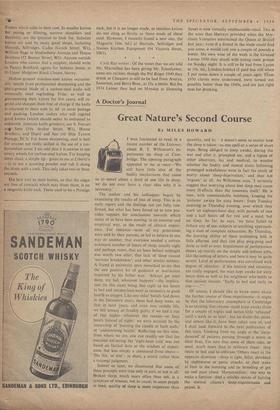A Doctor's Journal
Great Nature's Second Course
By MILES HOWARD
I WAS fascinated to read, in a recent number of the Listener, about R. T. Wilkinson's ex- periments on sleep at Cam- bridge. The opening paragraph appealed to me at once—'We still have little idea of the
bodily mechanisms that cause us to spend about a third of our life in sleep; we do not even have a clear idea why it is necessary.'
The author and his colleagues began by examining the results of loss of sleep. This is an early report and the findings not yet fully con- firmed, but what has been found up to now pro- vides support for conclusions towards which many of us have been moving, in an amateur and empirical way, as the result of clinical experi- ence. For instance—most of my generation were told by their parents, or led to believe in one way or another, that everyone needed a certain minimum number of hours of sleep, usually eight and perhaps more; that an hour before midnight was worth two after; that lack of sleep caused `nervous breakdowns'; and other similar notions. A friend at university once remarked to me that the one positive bit of guidance or instruction imparted by his father was: `Always get your sleep, my lad, whatever happens'—the implica- tion (in this case) being that eight to ten hours in bed and unconscious were as necessary to good health as oxygen. Like any other beliefs laid down in the formative years, these had deep roots, so that in later years, and even into middle life, we felt uneasy or frankly guilty if we had a run of late nights—whatever the reason—or four hours instead of eight : we were accused by the censorship of 'burning the candle at both ends,' or `undermining health.' Reflecting on this now, from where we are, one can readily see that the sanction enforcing the 'eight-hour rule' was not based on factual data or the wisdom of experi- ence, but was simply a command from above— 'Do this, or else': in short, a moral rather than a rational judgment.
Sooner or later, we discovered that some of these precepts were true only in part, or not at all. Broken sleep, much more often than not, is a symptom of tension, not its cause; in some people at least, qUality of sleep is more important than quantity, and he - it doesn't seem to matter how the sleep is taken—as one spell or a series of short naps. Being obliged to keep awake, during the war and after it, prompted me, and a legion of other observers, lay and medical, to wonder whether the bodily and mental states following prolonged wakefulness were in fact the result of worry about `sleep-deprivation,' and thus not `organic' at all. As Wilkinson says, `I seriously suggest that worrying about lost sleep may cause more ill-effects than the insomnia itself.' He is now, with commendable boldness, keeping his `patients' awake for sixty hours: from Tuesday morning to Thursday evening, over which they work an eighteen-hour day, with periods of one and a half hours off for rest and a meal, but no sleep. So far, he says, `we have failed to reduce any of our subjects to anything approach- ing a state of complete exhaustion. By Thursday, the learning ability of these unsleeping folk is little affected, and they can play ping-pong and darts as well as ever. Impairment of performance shows up mainly on the simple and tedious jobs, like the sorting of letters, and here it may be quite severe. Level of performance was correlated with degree of stimulus: if his interest and attention are really engaged, the man kept awake for sixty hours does as well as his neighbour who' holds to that ancient maxim. "Early to bed and early to
rise Of course, I should like to know more about the further course of these experiments—it might be that the laboratory atmosphere at Cambridge is so exciting that anyone could keep awake there for a couple of nights and notice little 'rebound' until a week or so later : but no doubt this point, and others like it, have been taken care of, and I shall look forward to the next publication of this team. Looking from my angle at the 'sleep- demand' of patients passing through a storm in their lives, I'm sure that some of them take, or need, much more than in ordinary times: they retire to bed and to oblivion. Others react in the opposite direction --sleep is light, fitful, shredded by nightmares or panic attacks, or they wake at four in the morning and lie brooding or get up and pace about. Memorandum : one way to make a fortune—find a reliable means of halving the normal citizen's sleep-requirements and patent it.


































 Previous page
Previous page